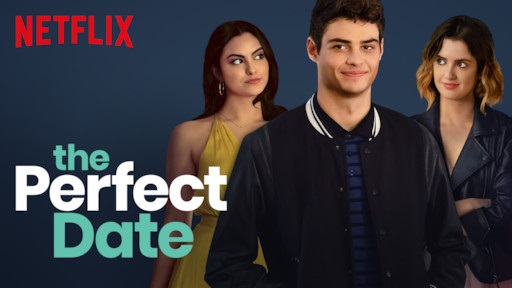Netflix Original movies are either hit-or-miss and when it comes to their rom-coms, and it’s usually miss– The Perfect Date is no exception.
The Perfect Date stars America’s most recent teenage heartthrob, Noah Centineo, in his upteenth Netflix chick-flick. He plays the ambitious high school senior Brooks Rattigan. Brooks’ greatest wish in life is to go to Yale, because “if you get accepted by [Yale], that means you’re somebody special.” Meanwhile, Brooks’ dad, a divorced washup of a writer, wants Brooks to attend UConn due to money concerns– despite the fact that Brooks would rather do anything other than go to UConn. He even goes as far to say that “UConn is like the girl down the street who eats food in bed and smells like it.” Ouch. What did UConn ever do to you?
In order to earn money to go to Yale, Brooks takes up an offer to take his classmate’s cousin, Celia, to a dance in exchange for some serious cash that Celia’s parents are promising his classmate for taking out his cousin.
The date goes as well as one can expect with a girl whose parents have to pay someone to hang out with her. It awkward and cringey, yet most of that can be attributed to the frankly awful writing that permeates the movie (more on that later). Despite Celia’s attitude during the date, it turns out that she was grudgingly impressed with Brooks’ date “services.” She even goes so far to say that Brooks is a “real professional” and he should make a job out of it– although she claims that she was actually joking, Brooks takes her seriously. He enlists his computer genius friend Murph to create an app where girls from around town could enlist Brooks to be their perfect stand-in boyfriend for their dates, determining what he wears, what he says and even his personality.
The premise is fine — pretty cliche and cheesy, yet it held a lot of potential due to the stand-in date aspect. Unfortunately, the screenwriters chose to go the overly predictable route, wasting a promising storyline and making the movie an hour and 30 minutes of boredom. From the first 15 minutes you already know what the ending is and how it will unravel. If you haven’t already realized what’s going to happen from the trailer, here’s the breakdown: The guy falls in love with the cute and popular girl, loses all his friends because he’s trying too hard to be cool, realized that he was wrong and should be proud to be himself instead, and discovers that his true love was the off-the-wall and sassy girl that was there for him all along. Nothing groundbreaking, nor particularly interesting.
The writing is truly terrible, however. They tried to make the “smart” characters witty and clever– unfortunately, they overcompensated, making the characters sound flat and forced, like adults pretending to be teenagers. It’s almost as if they didn’t know what teenagers are actually like. Take the scene where Brooks and Celia walk into the school dance: the shot pans to show a fancy prep school then immediately shifts into a montage of elegantly-clad teenagers taking selfies, because that’s all that people do at school dances, apparently. The exchange between the two characters is equally as painful:
BROOKS: Wow, this is your cafeteria?
CELIA: Center for culinary participation. Don’t let the glossy sheen fool you, the food still sucks.
BROOKS: You know, I admire your ability to ruin moments. You do it with panache. Why is nobody dancing? What, is dancing just a poor person thing now?
CELIA: You think people actually go to a dance to dance? No, they come here to take photos for their Instagram.
Firstly, I seriously doubt that there is a single school that calls their cafeteria the “center for culinary participation.” I get that the writers are trying to convey that the school is a rich and spoiled prep school, but there are much better ways to doing that. Secondly, no teenager unironically uses panache in their everyday language. Lastly– no, actually they are right that high schoolers only go to dances for the pictures; they got that one on the nose.
The acting itself wasn’t bad, but it was clear that they were trying to work with what they were given– which wasn’t a lot. The characters were very one-dimensional and stereotypical. Take Celia, for example, who could be the poster child for the Manic Pixie Dream Girl trope. She’s quirky and spirited and refuses to conform to the preppy rich kids from her school, but that’s it. That’s really all there is to her character. Brooks’ friend Murph has hardly any character at all– his only two traits is that he likes to program and is gay– and could, quite frankly, be cut out from the movie entirely without changing most of the plot. We’re told that he’s Brooks’ best friend, yet we don’t really see them interacting like best friends do. This highlights The Perfect Date’s main problem: they ignore one of the key rules of storytelling– to show, not tell.
At the end of the day, The Perfect Date isn’t the worst way to waste an afternoon, but it’s certainly forgettable. Maybe if you have nothing else to watch on Netflix you could check it out, but don’t expect a particularly good film.
If you want to read another review of The Perfect Date, check out Keeli Johnson’s review of it!

Leave a Reply